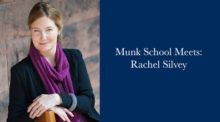Professor Rachel Silvey is in the Department of Geography and Planning, and serves as the Richard Charles Lee Director of the Asian Institute at the Munk School. A geographer with a lifelong interest in Asia, her research focuses on migration, development, and gender studies. Recently she sat down with us to discuss what drives her work at the Munk School and beyond.
What’s a global issue that you’re passionate about and why?
I think migration brings human struggles to the forefront of our understanding of global change. I study the relationship between places and people, which allows me to track shifts in the global political landscape and examine long-standing inequalities over time. Migration research can connect fine-grained, intimate details to more general processes that stretch beyond a single individual or place. It’s a window onto economic development, political conflict, gender dynamics, conceptions of citizenship, belonging, and identity.
Describe an eye-opening moment.
As an undergraduate student of Environmental and Southeast Asian Studies at the University of California in Santa Cruz, I spent a year living in Indonesia. I was reading a lot of feminist theory at the time, and it became clear to me that Indonesian migration scholarship didn’t have any gender component to it. I thought it was worth opening up the question. As I started doing research on the politics of gendered migration in Indonesia, I realized that it fit into the burgeoning subfield of feminist geography. It was luck and intuition – I knew there was something there. I always go back to Indonesia. It’s great to have that anchor and stay connected with individuals and families, within their communities and abroad, as they travel to Dubai, Singapore, Kuwait, Taiwan or Hong Kong to find work.
What impact do you want to make on the world or your local community?
I want students to feel that their scholarship and research is connected to their lives, and to larger communities of people. The Asian Pathways Research Lab, led by Dr. Emily Hertzman, for example, recently conducted a project asking students to interview their grandparents. It teaches them qualitative research methods, but it also allows them to see themselves as part of a global story that connects multiple generations. There’s a real need to recognize these stories before they disappear, and to learn from the experiences of elder community members. It’s meaningful not only for the students, but also for their grandparents, as well as the scholarly and popular literature on migration.
While formal policy per se is not the focus of my own work, I do hope that my research ultimately shapes public responses to the labour and migration problems that are so pervasive internationally. I am grateful to Ito Peng for her work with the Center for Global Social Policy and her support of our work. And I hope students’ work can also do that. The university gives us a chance to explore and reflect on important issues while sharing a truly transnational and personal political responsibility.
What does the future hold for you?
I have two forthcoming books. First, I am co-authoring a book with Rhacel Parrenas about migrant domestic workers from the Philippines and Indonesia working in the United Arab Emirates. The book speaks to debates about free versus unfree labour, immigration law and its limits, and the contested nature of domestic workers’ rights. Second, I am writing my own book about Indonesian women’s labour migration in the context of what many have termed the current “global migration crisis,” but which I argue is part of the longer history of labour export and the growth of migration infrastructures.
What is your personal philosophy?
Remain open. One of the amazing things about contemporary ‘area studies’ is that if you do it well, you’re constantly exposed to different ways of being, thinking, and relating to the world. And they challenge you, they force you to displace your certainties. This constant displacement is exciting – it keeps you curious, attentive to the myriad ways that everything is always changing.
January 29, 2018
